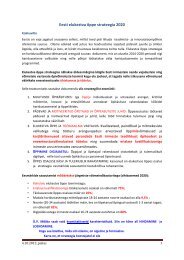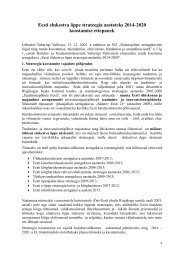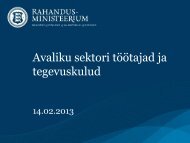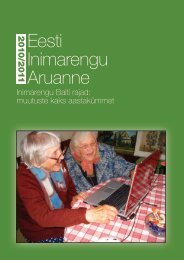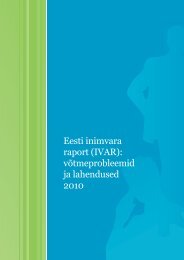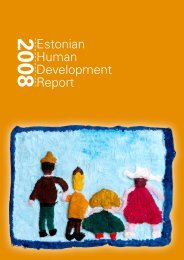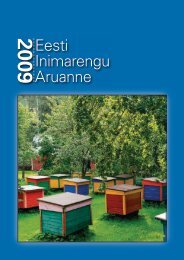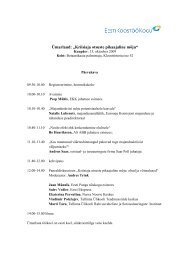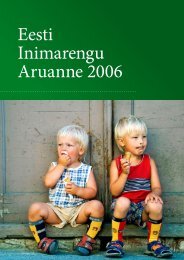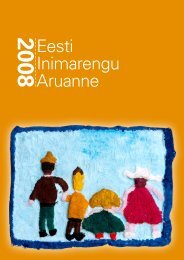DEVELOPMENT
The pdf-version - Eesti Koostöö Kogu
The pdf-version - Eesti Koostöö Kogu
You also want an ePaper? Increase the reach of your titles
YUMPU automatically turns print PDFs into web optimized ePapers that Google loves.
so in the future. Figure 1.5.7 shows that the number<br />
of people in Estonia who have never signed a petition<br />
for any reason has continually increased since 1990<br />
(23%), and reached 57% in 2011. At the same time,<br />
the number of people who have signed a petition, or<br />
are considering doing so in the future, has decreased<br />
year-by-year.<br />
In the comparison of the world’s countries, based<br />
on these indicators, Estonia is positioned between Turkey<br />
and Zimbabwe, while, for instance, in New Zealand,<br />
the percentage of people who have signed a petition is<br />
83%, and only 3% have never done it or would never do<br />
it under any circumstances (see Figure 1.5.8). However,<br />
Estonia’s position in the aforementioned ranking cannot<br />
be unequivocally interpreted, since there can be two<br />
different reasons for not participating in petitions: (a)<br />
the lack of political or civil activism or (b) the restriction<br />
of political freedoms, which reduces the likelihood of<br />
signing protests.<br />
Summarising the changes that have occurred in<br />
the values that stress survival versus self-expression<br />
during the last 10 years, it must be said that the Estonian<br />
population’s general trust in others have steadily<br />
increased, as has the sense of happiness and satisfaction<br />
with life. To some extent, the tolerance toward<br />
minorities has also increased. All of this could provide<br />
evidence that, on the map of world values, Estonia<br />
could slowly be moving from stressing values related<br />
to survival to placing greater importance on self-expressive<br />
values. At the same time, Estonia continues<br />
to be positioned in the group of the former Soviet<br />
Republics and African countries, where the percentage<br />
of people that stress post-materialistic values is 5% or<br />
even less. And this percentage has not notably changed<br />
during the last 20 years. Even more, during 20 years,<br />
the number of people in Estonia who would not sign a<br />
protest under any circumstances has doubled, reaching<br />
57% in 2011. Based on Inglehart and Welzel’s (2005)<br />
theory of cultural change, the latter speaks for the<br />
importance of survival values.<br />
1.5.7<br />
Has Estonia’s position on the cultural<br />
map of the world changed?<br />
Based on existing data, and not knowing whether, and<br />
to what extent, changes have taken place in people’s<br />
values elsewhere in the world, one can cautiously argue<br />
that Estonia’s position on the map of world values has<br />
not notably changed, compared to 1999. In 2011,<br />
compared to the people of other countries, Estonia’s<br />
population still considered secular-rational values to<br />
be more important, while also placing greater emphasis<br />
on survival rather than self-expressive values. The<br />
increase in trust, well-being and tolerance among<br />
Estonia’s residents during the last decades provides evidence<br />
of a small shift in the direction of self- expressive<br />
values. However, apparently, Estonia’s socio- economic<br />
development has not been sufficient, to date, to<br />
ensure the population a material and physical sense of<br />
security, and thereby, also the emergence of stronger<br />
post-materialistic values.<br />
Figure 1.5.8<br />
Percentage of people living in various states of the<br />
world in2010-2012, who have signed a petition (i.e. as<br />
a form of political protest that people can participate<br />
in), might do so in the future, or would never under any<br />
circumstances do it.<br />
Would never participate Might participate Have participated<br />
Percentage 0 10 20 30 40 50 60 70 80 90<br />
New Zealand<br />
Sweden<br />
USA<br />
Japan<br />
Trinidad and T<br />
South Korea<br />
Spain<br />
Poland<br />
Cyprus<br />
Colombia<br />
Peru<br />
Mexico<br />
Uruguay<br />
Chile<br />
Turkey<br />
Estonia<br />
Zimbabwe<br />
Ecuador<br />
Russia<br />
Philippines<br />
Nigeria<br />
Ghana<br />
Armenia<br />
Ukraine<br />
Kazakhstan<br />
Morocco<br />
Malaysia<br />
Kyrgyzstan<br />
Azerbaijan<br />
Percentage 0 10 20 30 40 50 60 70 80 90<br />
Source: World Values Survey, 6 th wave, 2010-2012.<br />
Figure 1.5.9<br />
Percentage of people living in Estonia, in 2011, by<br />
various birth cohorts that believe that homosexuality is<br />
never justified.<br />
Percentage<br />
90<br />
80<br />
70<br />
60<br />
50<br />
40<br />
30<br />
20<br />
10<br />
0<br />
1930-<br />
1939<br />
1940-<br />
1949<br />
1950-<br />
1959<br />
1960-<br />
1969<br />
1970-<br />
1979<br />
Source: World Values Survey, 6 th wave, 2011.<br />
1980-<br />
1989<br />
1990 and<br />
later<br />
56<br />
Estonian Human Development Report 2012/2013



